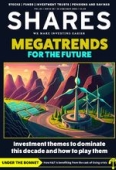Archived article
Please note that tax, investment, pension and ISA rules can change and the information and any views contained in this article may now be inaccurate.
Investors can be their own worst enemy: here’s one approach to fix that

Of all the challenges facing you as an investor, the father of value investing Benjamin Graham said the chief one and the ‘worst enemy’ is likely to be yourself.
One asset manager which seems to have taken this lesson to heart is Brown Advisory. Portfolio manager Mick Dillion, who helps steer the Brown Advisory Global Leaders Fund (BYPJ0V0), told Shares the team apply a set of rules to help them navigate deep rooted behavioural biases.
The chief problem, explains Dillon is that the oldest part of the brain, called the hippocampus developed millions of years ago when humans were roaming around on the savannah. That part of the brain is very instinctive and good in ‘fight or flight’ situations where split seconds can mean the difference between escape and becoming a meal for a predator.
It is not very useful however, in the world of investing where deep thinking and reflection are needed. This is performed by the ‘system two’ part of the brain or neocortex. In times of stress, (falling share prices) system one takes over and does everything it can to avoid pain and loss. Because it is ‘hard-wired’ into our brains, it is difficult to ignore.
That’s why Brown Advisory has developed a set to rules which forces the managers to act when a shareholding falls 20% or more. The natural response explains Dillon is to do nothing, rather like the proverbial rabbit in the headlights. Effectively investors are caught between a rock and a hard place. If they don’t sell, the pain gnaws away and if they sell and the stock recovers, they suffer regret.
Instead, fund managers at Brown Advisory are forced to either buy more or sell. This awakens the system two part of the brain and rationality takes over, at least in theory.
HOW HAS IT WORKED?
In such situations over the last six years the team have added to positions more than twice as many times as they sold but the hit rate (successes to failures) has remained at 67% and 76% respectively, demonstrating rational decision making in the heat of the moment.
As impressive as a two-thirds hit rate is, it still means getting a third of decisions wrong. Dillon likens it to football where stats on passes completed show no team ever achieves 100% accuracy.
During the early days of the pandemic the team were presented with an unusual situation with German event ticketing company CTS Eventim (EVD: XETRA). Advanced sales of tickets had to be returned when events were cancelled, which meant entertaining the idea that the business might have negative sales.
The team were concerned the company might run out of cash before the economy could reopen. Many scenarios were contemplated, but they eventually settled on the decision to buy more shares. The thinking was that it might take three years to develop a vaccine and one year to inoculate the population. The shares now trade above their pre-pandemic levels.
QUALITY APPROACH
The investment style of the fund is probably best described as bottom-up stock picking with a preference for high quality businesses and rational management teams acting in the best interests of shareholders. The aim is to build a high conviction portfolio of attractively valued businesses. The fund’s largest position is software giant Microsoft (MSFT:NASDAQ) which represents 7.5% of the portfolio. Dillon likes Microsoft’s cloud business which represents half of sales.
A recent addition to the portfolio was Taiwan Semiconductor Company (TSM:NASDAQ) which was bought before famed investor Warren Buffett announced Berkshire Hathaway (BRK.A:NYSE) had purchased a $5 billion stake.
Dillon said the combination of a big drop in the shares on fears of a Chinese invasion of Taiwan and the ubiquity of TSMC’s chips which run some 40% of global electronics were key attractions that led to the purchase.
Important information:
These articles are provided by Shares magazine which is published by AJ Bell Media, a part of AJ Bell. Shares is not written by AJ Bell.
Shares is provided for your general information and use and is not a personal recommendation to invest. It is not intended to be relied upon by you in making or not making any investment decisions. The investments referred to in these articles will not be suitable for all investors. If in doubt please seek appropriate independent financial advice.
Investors acting on the information in these articles do so at their own risk and AJ Bell Media and its staff do not accept liability for losses suffered by investors as a result of their investment decisions.
Issue contents
Case study
Editor's View
Feature
Great Ideas
News
- The case for a big rebound in growth stocks in 2023
- Vodafone stock at 25-year low as attention turns to cutting debt
- Oracle shares up more than 40% in three months
- Yet more evidence that the computer games industry has lost its pandemic mojo
- Why shares rallied on a stronger-than-expected US jobs number
- What do Next’s results tell us about the outlook for the retail sector?

 magazine
magazine








